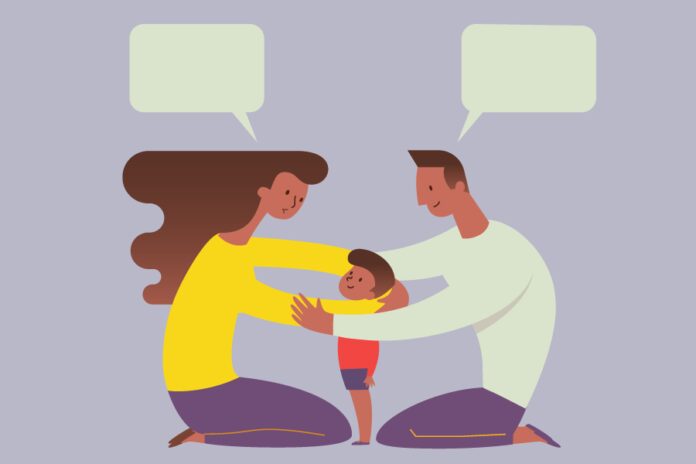
Parents educate and guide their children to the best of their ability. Sometimes, when the situation overwhelms them or they feel disoriented, they turn to intuition or use "folk wisdom", they apply what they believe to be correct or that their own parents taught them when they were young.
However, some advice from parents to children can have a devastating effect on the child's mind and, instead of unleashing its full potential, it ends up limiting it. The voice of the parents, in fact, can become an inner voice that accompanies us throughout our life.
There is no doubt that the vast majority of parents want their children to be successful in life, so they try to convey attitudes and ways of doing things that help them achieve those goals. But being successful isn't a guarantee of happiness or emotional well-being. Therefore, many parent-child advice that has been passed down from one generation to the next could turn into counterproductive and limiting beliefs.
Parents' advice to their children that it would be better to rephrase
Tip 1. Think ahead. Focus on the prize.
What should we tell him instead? Focus on the here and now.
A mind that is constantly focused on the future - first to get good grades, then to enroll in a good university, and finally to find a suitable job - will be more prone to greater amounts of stress and anxiety. Although there are several types of stress and a dose of eustress can act as a motivating agent, chronic stress maintained over time damages our health and cognitive functions, affecting our performance. Therefore, teaching children to focus on the future and what they can achieve is a lifelong sentence of stress.
In fact, focusing solely on the goal means living with blinders. Looking ahead prevents us from seeing the opportunities around us and, above all, reduces our ability to enjoy the here and now. Therefore, children could be much happier if we let them do what is spontaneous for them: focus on the present and make the most of it. The message they need to understand is that they don't have to mortgage their happiness today for a future goal.
Tip 2. Stress is inevitable. Keep trying.
What should we tell him instead? Learn to relax.
Anxiety disorders are diagnosed at an early age because children feel tremendous pressure to live up to the expectations of their parents and society at large. There is no doubt that life comes with a dose of tension and it is important that children develop adequate stress tolerance that allows them to deal with difficult situations, but the message we must send them is not that they push themselves to the limit but that they learn to relax before reaching the breaking point.
It is not advantageous to live in a state of constant overload, with busy schedules that require the consumption of stimulants to be able to sustain a superhuman rhythm while at night sedatives are used to be able to fall asleep. Indeed, it is no coincidence that a study conducted at the University of Helsinki revealed that children whose parents suffer from burnout syndrome they are more likely to suffer a breakdown in school. And perfectionism and stress are also passed on. Therefore, the best gift parents can give their children is to teach them relaxation techniques for children that allow them to avoid unnecessary stress.
Tip 3. Increase your strengths. Try not to make mistakes.
What should we tell him instead? Make mistakes and learn to fail.
Parents, like most people, tend to attach labels. Therefore, it is not surprising that they end up exaggerating certain abilities of their children while weakening others. If they notice that their child is particularly gifted in math or in a sport, they will encourage him to pursue this. At first glance, there is nothing wrong with that. However, this attitude promotes the so-called "fixed mindset", so that children are less likely to explore and discover new things.
When a child receives praise for being athletic or good at math, they will be less likely to get out of it comfort zone and, for example, feel inspired to write a poem or participate in a play. These children are also more frustrated when something goes wrong and are less likely to seek new challenges because they prefer to stick with what they know, what they are “good at”.
That is why it is important for children to learn to face new challenges, make mistakes, strive to develop new skills and, of course, fail. Psychologists at the University of Illinois have found that children will show a more optimistic and even enthusiastic attitude towards challenges if they know they just need to put in a little more effort or try again. Additionally, they will be less likely to feel bad about themselves when something doesn't go according to plan.
Tip 4. Don't be kind to yourself.
What should we tell him instead? Treat yourself with compassion.
Most people are their own worst critics and judges. Although self-criticism is good for growing and learning from our mistakes, when it is excessive it can become paralyzing, plunging us into a cycle of dissatisfaction, scolding and regret in which we end up thinking that we are not good enough or worth nothing.
Unfortunately, many parents believe that the best way to educate their children is to make them Spartans. So they end up being overly critical and teaching them to treat themselves harshly. But excessive self-criticism can turn into self-sabotage, undermining our self-esteem and generating a deep fear of failure.
Instead, good advice from parents to children is to learn to treat each other with compassion, which does not mean feeling sorry for yourself or closing your eyes for the things we do wrong, but simply treating ourselves as we would treat a friend in times of failure or pain. It means being able to love ourselves even when we make a mistake, finding a warm and comfortable place within us in which to feel protected.
Tip 5. Don't show your feelings. Crying is for the weak.
What should we tell him instead? Learn to manage your feelings.
Life is not fair. Most parents know this, and because of that strong sense of protection, they fear that others will harm their children. It's an understandable fear, but teaching them to hide their emotions won't protect them. In reverse. Emotions such as sadness act as a social adjunct by encouraging others to come closer to offer help and support.
Asking children not to cry, not to be disappointed by a gift they don't like, or forcing them to kiss a person they feel uncomfortable with, means gradually disconnecting them from their emotions. This will not help them manage them better, but it will facilitate an emotional accumulation process that will end up generating profound dissatisfaction and will put a strain on interpersonal relationships.
Instead, we need to teach children that emotions are not enemies and there is nothing wrong with feeling sad, disappointed, frustrated or even angry. The most important thing is to find the cause of those emotions and learn to express them assertively. This way you can develop children's emotional intelligence so that they become more resistant adults in the face of the harsh blows of life.
Sources:
Salmena-Aro, K. et. Al. (2011) Parents 'work burnout and adolescents' school burnout: Are they shared? European Journal of Developmental Psychology; 8 (2): 215-227.
Dweck, CS, & Leggett, EL (1988) A social-cognitive approach to motivation and personality. Psychological Review; 95 (2): 256-273.
Admission 5 bad parent-child tips - you probably were given was published first in Corner of Psychology.


















































